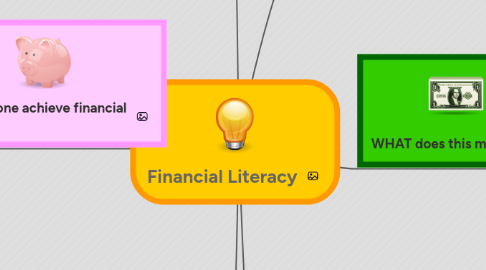
1. WHO does this impact?
1.1. High School Students
1.1.1. what to expect after HS, budgeting
1.2. College Students
1.2.1. how to manage debt, budgeting
1.3. Single Adults
1.3.1. manage debt/ buying a house
1.4. Married Couples
1.4.1. navigate process of buying a house
1.5. Parents/ Families with Children
1.5.1. buying another house, college savings for children, emergency fund, managing debt
1.6. Grandparents/Retired
1.6.1. Fixed Income and budgeting
1.7. U.S. Economy & Government
1.7.1. Financial Literacy & Education Commission
1.8. Global Economy
1.8.1. Organisation for Economic Co-operation and Development
1.9. This affects everyone differently
2. HOW can one achieve financial literacy?
2.1. Become educated about the basics of personal finance in order to make their own informed decisions
2.2. Create a Budget
2.2.1. Regularly Update Budget
2.3. Create a Savings Plan
2.3.1. Regular Savings
2.3.2. Retirement Savings
2.3.3. *Chilren's College Savings
2.4. Develop Plan for Managing Debt
2.4.1. Minimize Credit Card Debt
2.4.2. Determining the right type of mortgage
2.4.3. Understanding Auto Loan terms
2.4.4. Understanding Student Loan terms
2.5. Organize Tax Information
3. WHERE can people get more information and resources?
3.1. Proffessionals
3.1.1. Real Estate Agents
3.1.2. Tax Consultant
3.1.3. Financial Literacy & Education Commission
3.1.4. Financial Advisors
3.1.4.1. Student Financial Advisors
3.1.5. Stock Brokers
3.1.6. Banks and Credit Unions
3.1.7. Insurance Agents/ Agencies
3.1.8. Certified Public Accountant
3.2. Books
3.3. Community Work Shops
3.4. Banks and Credit Unions
4. WHY is this important?
4.1. Improve Personal Finances
4.2. Stabalize U.S. Economy
4.3. Less dependency on government support programs
5. WHAT does this mean?
5.1. "Financial literacy is the ability to understand finance. More specifically, it refers to the set of skills and knowledge that allows an individual to make informed and effective decisions through their understanding of finances."
5.2. Banking
5.2.1. Banks vs. Credit Unions
5.2.2. Understanding Online Banking
5.3. Savings Plans
5.3.1. Emergency Fund
5.3.2. Children College Fund
5.3.3. Retirement
5.4. Insurance
5.4.1. Home
5.4.2. Auto
5.4.3. Life
5.4.4. Business
5.5. Credit and Debt
5.5.1. Credit Cards
5.5.2. Loans
5.5.2.1. Auto Loan
5.5.2.2. Student Loan
5.5.2.3. Home Mortgage
5.6. Investments
5.6.1. Stocks
5.6.2. Bonds
5.6.3. Mutual Funds
5.6.4. Real Estate
5.6.5. Tangible Assets
5.7. Taxes
5.8. Budgeting
5.8.1. Weekly
5.8.2. Monthly
5.8.3. Quarterly
5.8.4. Annually
6. WHEN is financial literacy needed?
6.1. Needed by all individuals who will receive any form of income
6.1.1. Incorporated into High School Programs
6.1.2. Incorporated into College core classes
6.1.3. Community Work Shops to share up to date information

